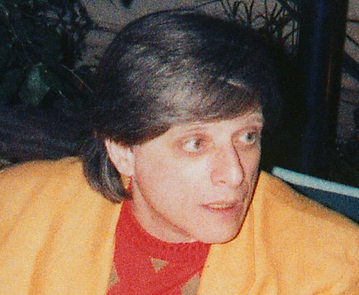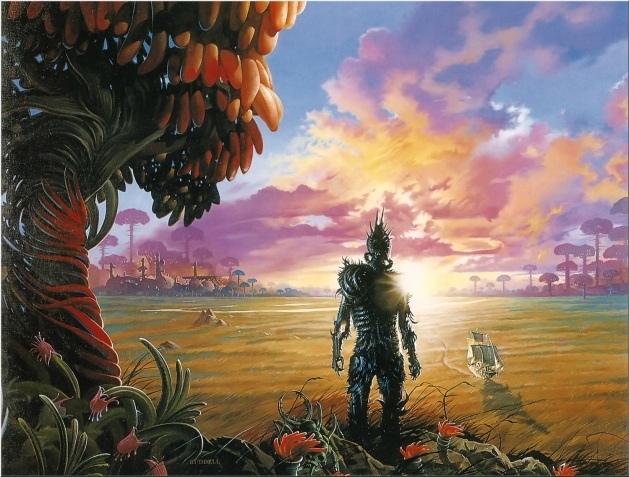Thomas Mann’s The Magic Mountain, however great its merits, has hardly been much regarded by anyone as a war novel, much less a military novel, despite the role of the First World War as both subtext and conclusion. But it does offer a nuanced and even important portrayal of a soldier without a war or even an army, certainly without comrades. I am talking, of course, of Cousin Joachim.
The Magic Mountain is a long book, and a book that needs to be long, but I’ll give a brief summary of the plot and setting. In the early 20th century, a young German man named Hans Castorp visits his cousin, Joachim Ziemssen, at a tuberculosis sanatorium in the Swiss Alps. His visit of three weeks becomes a stay of seven years. Hans is the novel’s protagonist, and since Joachim’s character exists largely in contrast to Hans, the latter needs some description.
Hans is a bourgeois German orphan, raised by his uncle. At the opening of the novel, Hans has recently become an accredited engineer, and has accepted an offer to start work at a shipbuilding firm when he returns from visiting his cousin. Hans, however, has no real purpose in his life. His inheritance, while not enough to live on respectably, insures him against the possibility of discomfort. He regards his coming assumption of the identity of Marine Engineer with indifference if not positive uninterest. His only passions are trivial vices, particularly his favorite brand of cigar. He feels ill by the end of his intended stay; the sanatorium’s doctor delivers a diagnosis; Hans makes the fateful calculation that the proceeds of his inheritance will fund his stay indefinitely. Hans really does have something, probably, although the doctor – who is also the director – is also running a business. But nothing draws Hans back to the “flatland”, and he falls complacently into the rhythms of the sanatorium.
Hans’s cousin, Joachim, has chosen a military rather than technical career. And his tuberculosis is an incontrovertible fact. Just as Hans has accepted an offer but has not worked a day for his company, Joachim has taken some steps towards becoming an officer but has never actually served. Both young men, it must be said, are “wanna-bes”. But they differ in their attitude towards this status.
Joachim is not completely immune to the lull of the Berghof sanatorium – he introduces Hans and the reader to the routine and subculture of the institution with the attitude of a veteran convalescent which he is – but he clearly identifies himself as a soldier and officer, and he with some aloofness refuses to allow himself to be totally submerged into the role of consumptive patient at the expense of this self-image.
Summaries of Joachim’s character speak of his sense of “duty”, and that is true, but the details of this sense are important. Joachim is not simply “dutiful”, but a subscriber to youthful idealizations of military service. He is, when we meet him, emphatically not an officer, not a real soldier, but he nevertheless maintains a military appearance and bearing which is repeatedly remarked upon not only the narrator but by other patients. When the excitable and pompous Italian, Settembrini, addresses Hans as “Engineer” he is making Hans’s position in the world out to be somewhat more than it is in order to exaggerate the level of society in which Settembrini himself resides (as he probably exaggerates his own position in the world somewhat). Hans complacently accepts this, as he does most everything else. But when Settembrini calls Joachim lieutenant…he is doing the exact same thing, but anyone who has known or has been a cadet cannot call Joachim’s blushing decision to let the title stand an innocent indulgence.
The brute fact is that Joachim is a wannabe, even a poseur. I want to be careful here, because antebellum Europe was a different world. Ernst Junger said that anyone who did not know Europe before the Great War cannot grasp what was lost. I am also reminded that the cadets at West Point started changing out of their uniforms to go into New York City during Vietnam; they have never resumed their old habits. Still, I do not think that Joachim’s soldierly aspirations were any less sincere or desperate than those of similarly situated young men today, but perhaps some of the outward signs of his desperate sincerity were more indulged by his society. Whatever the attitudes of others however, Joachim is pretending in both the archaic and modern sense of the word.
Many of the Berghof’s residents are professional patients, and while some – including Hans – are malingering from the healthy world, for others medical necessity really does require their indefinite claustration. Joachim resolves to return to the real world, the “flatlands” during the spring following Hans’s arrival, against the admittedly generally suspect advice of his doctor. In nine months he accedes to the rank of full lieutenant and participates in the early-1900s equivalent of a CTC rotation. And then his sickness returns.
Nine months he’s had his heart’s desire, and been living in a fool’s paradise. Well, it wasn’t a snakeless paradise—it was infected, more’s the pity…He’s got as far as lieutenant, anyhow, there’s that to say. But what’s the use of it? The good Lord sees your heart, not the braid on your jacket, before Him we are all in our birthday suits, generals and common men alike…
So says the Berghof doctor. Joachim himself returns to the sanatorium – implicitly as a terminal case. And he does die there, facing death like “a soldier, and brave” as the chapter is named.
I think that Joachim made the right decision, by the way, and I hope I would have acted the same way. The hospital patient is a sort of inverse of the soldier. I can think of abstract schema for thinking about this but ultimately the hospital is where the man who’s expected to bear arms ends up when he isn’t fit. The reasons may be honorable, or otherwise, and anyone who has been in a military hospital knows full well both the distinction and the temptation to move from the one category into another. (By the way, Catch-22 opens in a hospital for this reason.)
What impressed me about Joachim’s story is how he must have appeared to those fortunate enough to serve without concern for their health. An almost forgotten old classmate enters the unit behind the curve, serves well enough, but ultimately his health catches up to him and he leaves after a short period. I have known real people like this, and pitied them. But Joachim is not to be pitied. He lived and died as a soldier; that he never heard a shot fired in anger does not take away from this. There are others serving, now, who are in a similar position, who share their lot with soldiers in the past. Those called to service must make the best of their lot and not regret having missed the show during their allotted time.
Is there something about military service that promotes, or at least conduces, this sort of dedication? Why can’t Hans feel the same way about being an engineer as Joachim does about being a soldier? Hans is, obviously, not the same sort of man as Joachim but is that why he chose to become an engineer rather than an officer, or because of it? To answer all of these questions, it is quite obvious that to enter military service is to be initiated into a new state of being. If this sounds a little outré, consider for even a moment the importance placed on the “combatant-noncombatant distinction” in legal and moral conceptions of war.
Could engineers become an initiatory caste like professional soldiers? I don’t think it’s physically or socially impossible. In such a world I suspect Hans would have chosen a different area of study.
Joachim’s death is not his last appearance in the novel; he makes an extraordinary postmortem appearance. To appreciate the effect of this without actually going through the trouble of reading the book, understand that Mann write in a completely realist manner except in this very specific scene. There is, it must be said, one other episode in which Hans, on the verge of perishing from hypothermia, hallucinates at some length, and this narratively prefigures the frankly supernatural event which occurs later.
The Berghof patients throughout the novel occupy themselves with various faddish distractions. After years of Hans’s residence, one such fad is spiritualism. After seven hundred pages of unrelenting realism, and after treating the newly arrived medium’s provenance with the same ambiguity as that of the doctor’s, Hans asks to see his cousin during a séance. And
“now followed the most extraordinary hours of our hero’s young life…we may assume them to have been the most extraordinary he ever spent.”
For, after much ceremony, the playing of Gounod’s Faust opera and appeals to God Almighty, he Joachim appears to both Hans and his companions:
“[Hans] did not look up. A bitter taste came in his mouth. He heard another voice, a deep, cold voice, saying: ‘I’ve seen him a long time.’
The record had run off, with a last accord of horns. But no one stopped the machine. The needle went on scratching in the silence, as the disk whirred round. Then Hans Castorp raised his head, and his eyes went, without searching, the right way.
There was one more person in the room than before. There in the background, where the red rays lost themselves in gloom, so that the eye scarcely reached thither, between writing desk and screen, in the doctor’s consulting chair, where in the intermission Elly had been sitting, Joachim sat. It was the Joachim of the last days, with hollow, shadowy cheeks, warrior’s beard, and full, curling lips. He sat leaning back, one leg crossed over the other. On his wasted face, shaded though it was by his head covering, was plainly seen the stamp of suffering, the expression of gravity and austerity which had beautified it. Two folds stood on his brow, between the eyes, that lay deep in their bony cavities; but there was no change in the mildness of the great dark orbs…That ancient grievance of the outstanding ears was still to be seen under the head covering, his extraordinary head covering, which they could not make out.
Cousin Joachim was not in mufti. His sabre seemed to be leaning against his leg, he held the handle, one thought to distinguish something like a pistol case on his belt. But that was no proper uniform he wore. No color, no decorations; it had a collar like a tunic jacket, and side pockets. Somewhere low down on the breast was a cross. His feet looked large, his legs very thin, they seemed to be bound or wound for the business of sport more than war. And what was it, this head-gear? It seemed as though Joachim had turned an army cook-pot upside down on his head, and fastened it under his chin with a band. Yet it looked quite properly warlike, like an old-fashioned foot soldier, perhaps.”
Joachim’s momentary resurrection does not include rejuvenation; the description given of his bodily appearance is identical to the earlier description of his corpse. And he has discarded his embroidered jacket for the uniform of the First World War: a drab pocketed tunic with an Iron Cross, puttees, steel helmet, and gas mask (“something like a pistol case on his belt”). Perhaps Joachim, denied the opportunity he sought – not entirely knowingly — to suffer in this panoply in life, is granted it in death.
When the Great War breaks out, in ten pages Hans goes from the Berghof to the battlefield. The book ends with his surviving an artillery bombardment; there will be others, and the Mann closes with the remark that his fate is not the subject of the novel – though “thy prospects are poor.” The seven years’ progression of Hans’s development puts him right where his cousin started off.




![844de8c13a4e419a07f71124aa4d341e[1]](https://i0.wp.com/sfoil.net/wp-content/uploads/2018/09/844de8c13a4e419a07f71124aa4d341e1.jpg?resize=297%2C444&ssl=1)







